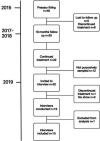"I just wear it and I become normal": a qualitative study of Tanzanian women's experiences with long-term vaginal pessary use for stress urinary incontinence
- PMID: 33472777
- PMCID: PMC7818809
- DOI: 10.1136/bmjopen-2020-040009
"I just wear it and I become normal": a qualitative study of Tanzanian women's experiences with long-term vaginal pessary use for stress urinary incontinence
Abstract
Introduction: Previous research has shown that vaginal pessaries are a cost-effective treatment for women worldwide suffering from stress urinary incontinence. However, little is known about African women's experiences with vaginal pessary use. The aim of this study was to understand the experiences of vaginal pessary use among Tanzanian women who had received long-term pessary treatment for stress urinary incontinence.
Methods: 15 semi-structured, individual interviews were conducted over a 2-month period in 2019 with Tanzanian women living in the Kilimanjaro Region who suffered from stress urinary incontinence and who had been using a pessary for at least 18 months. The interview transcripts were analysed using qualitative content analysis.
Results: The primary motivation for seeking treatment were discomfort from symptoms, social consequences and low quality of life. Perceived benefits from pessary use included improved quality of life with reacquired abilities to perform daily activities, participate in social gatherings, feeling symptom relief and improved sexual relations. Further, some women saw pessary treatment as superior to other locally available treatment options. Perceived barriers for pessary use included shame, husband's disapproval, limited access to treatment and lack of knowledge among the women as well as healthcare personnel.
Conclusion: Vaginal pessaries are well-perceived as a long-term treatment method among Tanzanian women suffering from stress urinary incontinence. This method may have potential to be implemented large scale in Tanzania if combined with basic health education.
Keywords: community gynaecology; gynaecology; urogynaecology.
© Author(s) (or their employer(s)) 2021. Re-use permitted under CC BY-NC. No commercial re-use. See rights and permissions. Published by BMJ.
Conflict of interest statement
Competing interests: None declared.
Figures
Comment in
-
Women's attitudes towards pessary self-care: a qualitative study.Int Urogynecol J. 2023 Aug;34(8):1899-1906. doi: 10.1007/s00192-023-05472-x. Epub 2023 Feb 16. Int Urogynecol J. 2023. PMID: 36795110 Free PMC article.
References
Publication types
MeSH terms
LinkOut - more resources
Full Text Sources
Other Literature Sources
Medical


